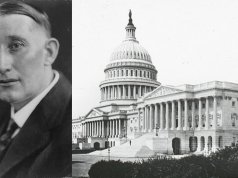

(Editor’s Note: Vital Conversations is a running series of commentaries from various faith leaders. The series is sponsored by Phillips Theological Seminary, though contributions come from theologians who are unassociated with the seminary. To submit work for Vital Conversations, simply email Editorial@NonDoc.com.)
When many of the Republican Party’s key leaders and most of the party’s presidential candidates began to call for the banning of Syrian refugees into the United States in November, it put the GOP into conflict with the views of both the United States Conference of Catholic Bishops and the National Association of Evangelicals, as well as with at least one mainline Protestant denomination.
In other words, the call by so many of the GOP’s most important leaders to shut U.S. borders to Syrian refugees has put the party at odds with pretty much the entirety of the Christian Church, something that doesn’t happen all that often.
While some might say this shows the true colors of many conservative politicians — that they are merely using religion at times just to gain votes from the Christian electorate — there may be another explanation for the disparity. It’s an explanation that highlights the fact that Christianity should never be confused with any political viewpoint, and that the power of the Christian faith is not the same power as that which fuels any particular political agenda.
Republican politicians calling for a halt to Syrian immigration do so citing security concerns. Surely, all politicians would agree national security is a top priority, and no serious politician would advocate willingly permitting terrorists to enter this country, thereby making our nation vulnerable to attack. Most everyone agrees that keeping the nation safe is the top responsibility not only of the president, but also of all our elected officials.
Safety, however, is not the top concern in Christianity. Christians know this not only because Jesus said as much, but also because Jesus demonstrated the power of being vulnerable. For example, according to the Bible, Jesus deliberately chose a man named Judas Iscariot to be among his closest confidants. Judas is the one who infamously betrayed Jesus into the hands of those who wanted to kill him.
But the story, as told to us in the four gospels (Matthew, Mark, Luke and John), makes it clear that the one thing Judas did not do was trick Jesus. In fact, Jesus knew the truth about those he had chosen. He knew Judas would betray him, probably long before Judas himself had turned against him. He knew Judas was a thief, but what did Jesus do? He made Judas his treasurer, putting him in charge of his finances. Jesus did what no politician would or should ever do. He granted asylum to a traitor. He made himself vulnerable to a traitor’s schemes.
By this vulnerability, Jesus showed the power of the Christian message. The power of Christianity is not rooted in sheer displays of might but rather in the apparent absurdity of humility and weakness. Judas’ betrayal led to Jesus’ death by Roman crucifixion, but that moment of death and disgrace has given the Christian religion its power for more than 2,000 years.
The American theologian Reinhold Niebuhr pointed out that there is a limit to what God’s power can do as mere power. To be sure, Christians believe God has the power to stop any foe and to vanquish any threat. But unlike the view of God maintained by other religious traditions, God’s power is most clearly seen not by forcing his enemies into submission, but by conquering the rebel’s heart. And God does that by being vulnerable.
This understanding of the Christian faith explains why many Christians are pacifists, some even going so far as to refuse to defend themselves if it means taking the life of an aggressor. It also helps explain why today Christianity is the most persecuted religion in the world. Jesus said it would be this way. But it is vulnerability, not aggression, that gives Christianity its power.
It should come as no surprise, therefore, to see that the interests of the Christian Church and the interests of a sovereign nation are not always the same. This makes politics a difficult challenge for the Christian. But it also may explain why sometimes what is best for one’s country is not what is best for one’s faith, and Christians should expect that their values and goals will never align perfectly with the platform of any political party.
Previous installments of Vital Conversations
In Trump, Republican Party gets the savior it has sought
With Jesus born, Mary would have been uninsured in OK
Faith community dialogue: Criminal justice reform
Save persecution label for when liberty is endangered
Science, religion agree: ‘We are part of nature’
Ten Commandments: Reactions spur moral discussion
Vital Conversations: Christianity needs a Jon Stewart
Imam: A Muslim is your brother from another mother
Pope’s visit should ‘enrich our impoverished discourse’
Vital Conversations: Truth seekers can lose arguments
‘Vital Conversations’ help spiritual minds





















